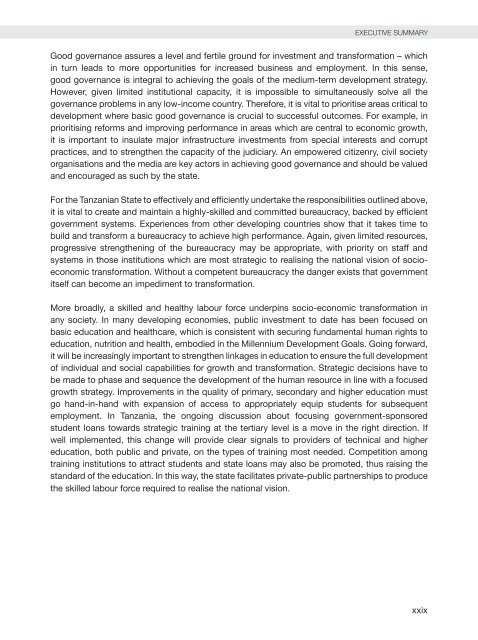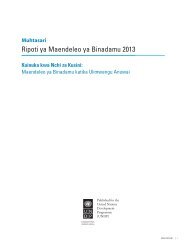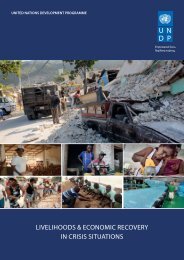Poverty and Human Development Report 2009 - UNDP in Tanzania
Poverty and Human Development Report 2009 - UNDP in Tanzania
Poverty and Human Development Report 2009 - UNDP in Tanzania
You also want an ePaper? Increase the reach of your titles
YUMPU automatically turns print PDFs into web optimized ePapers that Google loves.
eXeCUtiVe sUMMarY<br />
Good governance assures a level <strong>and</strong> fertile ground for <strong>in</strong>vestment <strong>and</strong> transformation – which<br />
<strong>in</strong> turn leads to more opportunities for <strong>in</strong>creased bus<strong>in</strong>ess <strong>and</strong> employment. In this sense,<br />
good governance is <strong>in</strong>tegral to achiev<strong>in</strong>g the goals of the medium-term development strategy.<br />
However, given limited <strong>in</strong>stitutional capacity, it is impossible to simultaneously solve all the<br />
governance problems <strong>in</strong> any low-<strong>in</strong>come country. Therefore, it is vital to prioritise areas critical to<br />
development where basic good governance is crucial to successful outcomes. For example, <strong>in</strong><br />
prioritis<strong>in</strong>g reforms <strong>and</strong> improv<strong>in</strong>g performance <strong>in</strong> areas which are central to economic growth,<br />
it is important to <strong>in</strong>sulate major <strong>in</strong>frastructure <strong>in</strong>vestments from special <strong>in</strong>terests <strong>and</strong> corrupt<br />
practices, <strong>and</strong> to strengthen the capacity of the judiciary. An empowered citizenry, civil society<br />
organisations <strong>and</strong> the media are key actors <strong>in</strong> achiev<strong>in</strong>g good governance <strong>and</strong> should be valued<br />
<strong>and</strong> encouraged as such by the state.<br />
For the <strong>Tanzania</strong>n State to effectively <strong>and</strong> efficiently undertake the responsibilities outl<strong>in</strong>ed above,<br />
it is vital to create <strong>and</strong> ma<strong>in</strong>ta<strong>in</strong> a highly-skilled <strong>and</strong> committed bureaucracy, backed by efficient<br />
government systems. Experiences from other develop<strong>in</strong>g countries show that it takes time to<br />
build <strong>and</strong> transform a bureaucracy to achieve high performance. Aga<strong>in</strong>, given limited resources,<br />
progressive strengthen<strong>in</strong>g of the bureaucracy may be appropriate, with priority on staff <strong>and</strong><br />
systems <strong>in</strong> those <strong>in</strong>stitutions which are most strategic to realis<strong>in</strong>g the national vision of socioeconomic<br />
transformation. Without a competent bureaucracy the danger exists that government<br />
itself can become an impediment to transformation.<br />
More broadly, a skilled <strong>and</strong> healthy labour force underp<strong>in</strong>s socio-economic transformation <strong>in</strong><br />
any society. In many develop<strong>in</strong>g economies, public <strong>in</strong>vestment to date has been focused on<br />
basic education <strong>and</strong> healthcare, which is consistent with secur<strong>in</strong>g fundamental human rights to<br />
education, nutrition <strong>and</strong> health, embodied <strong>in</strong> the Millennium <strong>Development</strong> Goals. Go<strong>in</strong>g forward,<br />
it will be <strong>in</strong>creas<strong>in</strong>gly important to strengthen l<strong>in</strong>kages <strong>in</strong> education to ensure the full development<br />
of <strong>in</strong>dividual <strong>and</strong> social capabilities for growth <strong>and</strong> transformation. Strategic decisions have to<br />
be made to phase <strong>and</strong> sequence the development of the human resource <strong>in</strong> l<strong>in</strong>e with a focused<br />
growth strategy. Improvements <strong>in</strong> the quality of primary, secondary <strong>and</strong> higher education must<br />
go h<strong>and</strong>-<strong>in</strong>-h<strong>and</strong> with expansion of access to appropriately equip students for subsequent<br />
employment. In <strong>Tanzania</strong>, the ongo<strong>in</strong>g discussion about focus<strong>in</strong>g government-sponsored<br />
student loans towards strategic tra<strong>in</strong><strong>in</strong>g at the tertiary level is a move <strong>in</strong> the right direction. If<br />
well implemented, this change will provide clear signals to providers of technical <strong>and</strong> higher<br />
education, both public <strong>and</strong> private, on the types of tra<strong>in</strong><strong>in</strong>g most needed. Competition among<br />
tra<strong>in</strong><strong>in</strong>g <strong>in</strong>stitutions to attract students <strong>and</strong> state loans may also be promoted, thus rais<strong>in</strong>g the<br />
st<strong>and</strong>ard of the education. In this way, the state facilitates private-public partnerships to produce<br />
the skilled labour force required to realise the national vision.<br />
xxix





